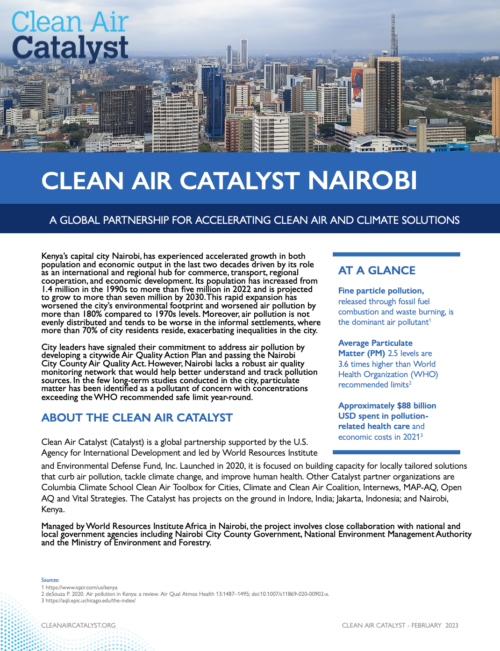Clean Air Catalyst Fact Sheet – Nairobi, Kenya


Kenya’s capital city Nairobi, has experienced accelerated growth in both population and economic output in the last two decades driven by its role as an international and regional hub for commerce, transport, regional cooperation, and economic development. Its population has increased from 1.4 million in the 1990s to more than five million in 2022 and is projected to grow to more than seven million by 2030. This rapid expansion has worsened the city’s environmental footprint and worsened air pollution by more than 180% compared to 1970s levels. Moreover, air pollution is not evenly distributed and tends to be worse in the informal settlements, where more than 70% of city residents reside, exacerbating inequalities in the city.
City leaders have signaled their commitment to address air pollution by developing a citywide Air Quality Action Plan and passing the Nairobi City County Air Quality Act. However, Nairobi lacks a robust air quality monitoring network that would help better understand and track pollution sources. In the few long-term studies conducted in the city, particulate matter has been identified as a pollutant of concern with concentrations exceeding the WHO recommended safe limit year-round.
Clean Air Catalyst (Catalyst) is a global partnership supported by the U.S. Agency for International Development and led by World Resources Institute and Environmental Defense Fund, Inc. Launched in 2020, it is focused on building capacity for locally tailored solutions that curb air pollution, tackle climate change, and improve human health. Other Catalyst partner organizations are Columbia Climate School Clean Air Toolbox for Cities, Climate and Clean Air Coalition, Internews, MAP-AQ, Open AQ and Vital Strategies. The Catalyst has projects on the ground in Indore, India; Jakarta, Indonesia; and Nairobi, Kenya.
Managed by World Resources Institute Africa in Nairobi, the project involves close collaboration with national and local government agencies including Nairobi City County Government, National Environment Management Authority and the Ministry of Environment and Forestry.

